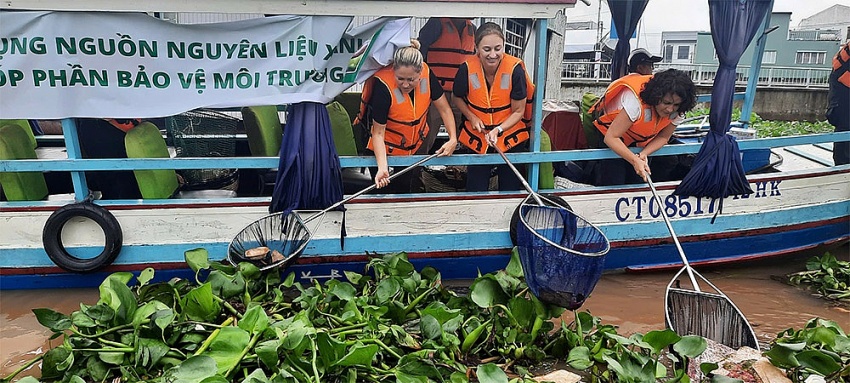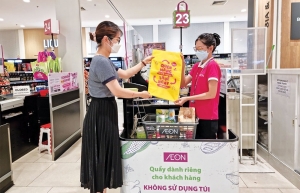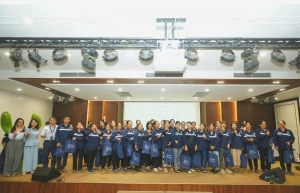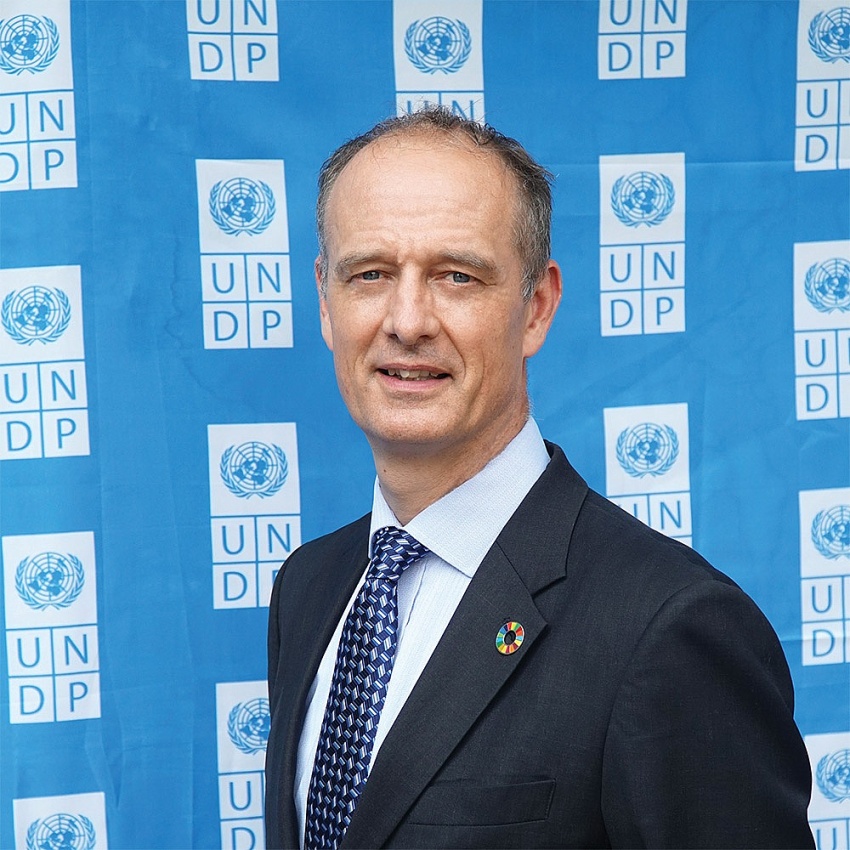Vietnam urged to accelerate fight against plastic waste
Dzeneta Mulabegovic, strategic advisor to the United Nations Development Programme (UNDP) resident representative on private sector engagement in Vietnam, said that the nation’s pursuit of sustainable development was being compromised by a growing demand for nylon bags and plastic products, which are exacerbating pollution both on land and in waterways.
 |
| Plastic waste in rivers, streams, and canals remains a pressing issue |
At last week’s launch of a campaign to collect rubbish on Can Tho River in the Mekong Delta city of the same name, Mulabegovic cited studies indicating that Vietnam generates approximately 2.93 million tonnes of domestic solid waste annually, with 0.07 million tonnes (2.5 per cent) leaking into waterways. A significant portion of this waste floats in rivers, while some drifts along the coast or sinks into the sea. Studies also indicate that rivers are the primary contributors to ocean plastic pollution.
“Can Tho generates 650 tonnes of waste daily. Despite a high collection rate of 85-90 per cent, the city faces challenges managing waste leakage into waterways, particularly around floating markets, rivers, and lakes,” Mulabegovic said.
Ngo Thi Van, a resident who has earned her living on the river’s Cai Rang floating market for 20 years, told VIR that it had become a common habit for her four-member family to dispose of all waste into the river after use.
“It’s very convenient,” Van said. “We can’t store it on our boat, which is small and also serves as our home.”
The floating market, one of the most renowned tourist destinations in Can Tho, is also one of the areas with the most waste. Hundreds of boats, serving as homes for thousands of residents like Van, dispose of nearly all their waste into the water. Nylon bags and plastic containers for quick meals are the most common waste items.
“Addressing this issue requires both short-term and long-term solutions,” said Mulabegovic.
According to Mulabegovic, one key solution is deploying automated systems that efficiently collect waste and transport it to shore, where it can be processed by city waste management systems. This approach prevents waste and plastic from travelling from rivers to the sea, reducing marine plastic pollution.
“In Can Tho, we’ve already seen promising initiatives like the Interceptor 003 from The Ocean Cleanup,” she noted.
Since 2021, the Interceptor, the first scalable solution to prevent plastic from entering oceans via rivers, has been in operation. The automatic rubbish collecting machine is designed to collect up to 50 tonnes of rubbish per day at optimal capacity.
Can Tho is the first city in the Mekong Delta region and one of 15 global locations applying such advanced technology to reduce plastic pollution in rivers and oceans through rubbish interceptors and river barriers.
With a dense river and canal system, especially in the Red River and Mekong River deltas, solid and plastic waste generation in Vietnam has increased due to socioeconomic activities. It is estimated that the average Vietnamese person generates 1.2 kilogramme of waste per day, amounting to nearly 70,000 tonnes across the whole country. Over 70 per cent of this waste ends up in landfills, with only 13 per cent incinerated for energy recovery.
Plastic waste accounts for 50-80 per cent of marine debris, a figure expected to rise in the near future.
According to the International Union for Conservation of Nature, plastic pollution poses significant threats to the marine ecosystem, leading to environmental degradation. Discarded plastic products are frequently found in canals and sewers, causing flooding, foul odours, vermin infestations, and the spread of disease. Furthermore, plastic pollution contributes to methane emissions, which are harmful to human health.
Research by the environmental protection organisation For A Strawless Ocean shows that 71 per cent of seabirds and 30 per cent of turtles have been found with plastic in their stomachs. Plastic can persist in the environment for over 2,000 years without breaking down.
“Plastic waste in rivers, streams, and canals, along with leakage into the sea, remains a pressing issue. Vietnam has set an ambitious target to reduce marine plastic pollution by 75 per cent by 2030,” said Hoang Thanh Vinh, programme officer in charge of waste and the circular economy at the UNDP in Vietnam.
“Efforts to collect and prevent plastic waste in water bodies are critical moving forward,” Vinh said. “There need to be opportunities for organisations and individuals to engage in this work, and a legal framework must be established to ensure that waste collection activities are carried out effectively.”
Mulabegovic emphasised the importance of community involvement.
“We urge participation from all communities, individuals, and organisations to protect the environment. Everyone can contribute to stopping plastic pollution at its source and ‘make room for life,’ as the theme of the 2024 World Cleanup Day suggests. Small efforts can lead to big transformations, and anyone can be a hero in the fight against plastic pollution,” he said.
In 2021, the government approved a project to strengthen plastic waste management in Vietnam. It aims to improve mechanisms, policies, and legal regulations in this sector.
Under the project, the government will gradually reduce the production and consumption of non-biodegradable plastic bags and single-use plastic products, while raising awareness among organisations, businesses, and the public about the harmful effects of such items. The initiative also encourages a shift towards eco-friendly alternatives.
The project also campaigns for producers and distributors of single-use plastic products to transition to eco-friendly equivalents and promotes the development and application of advanced technologies for managing plastic waste and producing environmentally friendly products.
| Patrick Haverman, deputy resident representative United Nations Development Programme in Vietnam
The lead-up to the fifth meeting of the Intergovernmental Negotiating Committee (INC) later this year is a critical period. This is expected to be the final meeting, and it is urgent for the global community to make significant progress before convening in Seoul in late November, if we are to achieve a global plastic treaty to end plastic pollution and protect human health and ecosystems. Achieving this ambitious goal requires active participation and collaboration from all relevant sectors. One key area of focus is addressing chemicals of concern in plastics. More than 13,000 chemicals have been detected in plastics, with over 3,200 identified as potentially harmful, and many others still not assessed. These chemicals pose serious health risks and contribute to environmental degradation, leading to long-lasting pollution. Studies have confirmed that microplastics have penetrated deep into human bodies, affecting the digestive, respiratory, endocrine, reproductive, and immune systems. Addressing issues like global plastic-induced health costs requires stringent regulations, robust monitoring, and increased public awareness. It is essential that the risks and costs of hazardous chemicals in plastics are clearly identified to develop effective measures and a roadmap for phasing out these chemicals. It is equally important to improve transparency in the plastics industry. Comprehensive data on the chemicals and additives in plastic products is needed to assess potential risks and develop effective regulations. Financial resources will also be critical for implementing the treaty. Several mechanisms have been proposed, including an independent financial mechanism and a global plastic pollution fee. Despite the considerable challenges, I believe we can achieve an effective treaty. The United Nations Development Programme is committed to providing technical support to the Vietnam delegation to participate in the upcoming intersessional meeting and INC-5. |
 | Younger generation gravitates to green initiatives Campaigns promoting environmental protection and encouraging a shift towards green consumption are gaining significant traction among young people. |
 | Promoting plastic waste collection and recycling towards a circular economy Suntory PepsiCo Vietnam, in tandem with VietCycle, held a training course on August 23 for informal workers who collect waste to show them how to classify everyday items that can be recycled. |
What the stars mean:
★ Poor ★ ★ Promising ★★★ Good ★★★★ Very good ★★★★★ Exceptional
Related Contents
Latest News
More News
- A golden time to shine within ASEAN (February 19, 2026 | 20:22)
- Vietnam’s pivotal year for advancing sustainability (February 19, 2026 | 08:44)
- Strengthening the core role of industry and trade (February 19, 2026 | 08:35)
- Future orientations for healthcare improvements (February 19, 2026 | 08:29)
- Infrastructure orientations suitable for a new chapter (February 19, 2026 | 08:15)
- Innovation breakthroughs that can elevate the nation (February 19, 2026 | 08:08)
- ABB Robotics hosts SOMA Value Provider Conference in Vietnam (February 19, 2026 | 08:00)
- Entire financial sector steps firmly into a new spring (February 17, 2026 | 13:40)
- Digital security fundamental for better and faster decision-making (February 13, 2026 | 10:50)
- Aircraft makers urge out-the-box thinking (February 13, 2026 | 10:39)


 Tag:
Tag:











 Mobile Version
Mobile Version